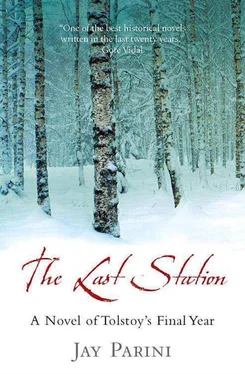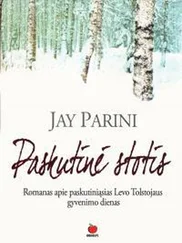He put his frail hand on my forehead and asked me to lie on the couch. I protested, of course, but he insisted.
‘Lie here. Take a brief nap. I find that brief naps can help a great deal when one doesn’t feel well.’ He put a blanket around my knees. ‘I will bring you a glass of tea.’
As he left the room to get my tea, I savored the unreality, the touching absurdity, of my situation. Here was the greatest author of the West, Leo Tolstoy, fetching tea for me, his new secretary, nearly sixty years his junior. This was a man I could easily love. Indeed, as I lay there on my back, surveying the crumbling plaster on the ceiling, I loved him already.
LATE WINTER RAMBLE IN ZASYEKA WOOD
The woods in winter fill with birds:
a clash of sparrows, jackdaws,
jays that flip among the shaggy boughs.
I step through brush, unharmed,
its brittle gauze of leafless branches
that can twig your eyes and make you bleed.
In the wind above the red Norwegian pines
a ragged crow waits, lazily
aloft, a cold eye hung
and hard as diamond in the ice blue sky.
Last summer, in a field nearby,
I saw that crow, its sharp beak
working on a fresh-dead dog. I watched them
lift off, veer into these woods
for some dark feast, black crow and dog.
What’s moldering beneath this crusty snow?
I put my ear down by a stream
to hear the gargling water underground,
lost syllables, lost tales, alive
beneath the ice. Whatever we can love
stays warm inside us, even when
we lose the name of life,
when sooty shadows lengthen on our spines,
when birds above us are the only song
we’ll hear again. I walk across
the frozen lid of water, where it sags
but doesn’t give. The world’s my home still,
even though I’ve got less days to count
than once, when dreaming I could fly,
I climbed a tree and leaped into the wind
with sleeves air-filled. Ah, falling
into soft snow, falling from a height I knew
would matter only if I hit a rock or stump…
I put my lips against an icy root,
where sap is running though it’s not yet spring.
It’s warm in winter,
as my mouth fills with dry snow, sweet-
sticky bark. I bend to pray:
Lord, let me know you as I know these woods,
Zasyeka’s warm and winter fluttering,
blue wings and black, the taste and tastelessness
of sappy snow, the flicker of these moods.
Mama came into the Remington room this morning as I was typing, carrying a shawl. A blue shawl spun to a woolly froth, which she insisted I simply must have over my legs. ‘You’ve never been a healthy girl,’ she said, tucking the ends around my knees. I reminded her that it was Masha who had always been ill, not me. Mama just wanted to snoop.
‘So what is this you’re typing?’ she asked, casually. ‘Letters? A new story?’ The woman has no grace.
‘A nosy woman soon loses her nose,’ I said.
‘Alexandra Lvovna!’
Whenever she wants to feign disapproval, she calls me by my Christian names. Even the servants around here call me Sasha. I am not pretentious.
‘He’s working with Bulgakov on For Every Day ,’ I said. ‘You needn’t worry. He’s been saying nothing in print about you.’ We both know that Papa writes the truth about her in his diary. That’s why she wants to read it all the time, and why Papa tries to keep it hidden. It’s become a silly game of hide-and-seek.
‘You’ve become rude and unladylike,’ Mama said. ‘I don’t know why Papa makes you do all his dirty work,’ she added, gesturing toward the typewriter.
‘There’s nothing dirty about the work I do for Papa.’ I turned my back and began typing again.
‘Do you like Bulgakov?’
‘Well enough,’ I said. ‘He’s polite. A bit naive, perhaps. But he’s young.’ In fact, I find him disingenuous, even shifty. But I would not tell Mama such a thing. She is always looking for potential allies, and Bulgakov strikes me as one of those people who quickly turn the color of any room they enter.
This past year Mama has become impossible, positively bleeding with jealousy and bourgeois rancor. Weeping, preening in the mirror, prowling about the house all night like a crazed animal! Papa does not deserve this. I cannot understand why God put this particular burden on Russia’s greatest author.
Masha, my sister, was Papa’s favorite before she died. She always appeared to understand his ideas, though I doubt she did; still, it’s not worth criticizing the dead. Since she passed away, I have made myself indispensable to Papa, and he is grateful to me. He loves me now, much as I love him. Masha loved him, but she was weak. Her cheeks were pale as eggshells, her lips were always blue, quivering even when she was silent. She professed Tolstoyan values, including chastity, but how she tumbled into the arms of Obolensky, that fool, who was all fancy breeding with no cash to back it up. Papa cried at her wedding, but the tears were not joyful ones. I, on the other hand, have resolved to dedicate myself to Papa. I have read his books and, unlike most of those who surround him, I have understood them.
And I will never marry. Why would the daughter of Leo Tolstoy wish to serve another man?
Mama can hardly bear it that Papa lets me type his work. She used to recopy his manuscripts in that finicky hand of hers. She likes to recall how day after day, during the composition of Anna , she would wake up dreaming about Vronsky, Levin, Kitty, wondering what would next befall them.
Sometimes I envy her those early days when Papa was fresh, writing novels and stories. But his work now is more important. Novels are bourgeois entertainment unless the author adopts a clear moral tone. This is why Papa dislikes William Shakespeare. ‘You can never tell where Shakespeare stands,’ Papa says. ‘He’s invisible. It is the duty of an author to present himself to the public. To say, this will do, and this will not do .’
Papa adores the clean copy that I bring him every morning, though he quickly spoils it, scratching out words, putting in new phrases, whole sentences, and paragraphs in the margins or between lines. He likes to make balloons at the side, full of corrections that I’m supposed to understand and incorporate into further drafts. I hate when I have to creep into his study to ask for clarification. Of course, he’s infinitely patient. He thanks me every time, as if anyone wouldn’t be glad to do as much for Leo Tolstoy.
I’m working late tonight, the lantern buzzing beside the typewriter, trying to finish today’s projects. What a day it has been! Sergeyenko’s father was here, one of Papa’s oldest friends. Father is always like a little boy around Sergeyenko, joshing and teasing. I love to see that. He brought us a gramophone for a gift, including a voice recording of Papa made some months before in Moscow. Mama put the record on that ghastly machine, with its brass horn and terrifying knobs. It was set up in the dining room on the table opposite the door, where everyone could gape at it. Our servants – the footmen, the cook, even a few stable boys – gathered in the hallway to listen. Some peered through the balustrade into the dining room as Papa’s voice boomed through the house in its queer distortion. It was Papa, yes. But it was not Papa. The glass vase on the mantel tingled to the point of shattering.
Читать дальше












